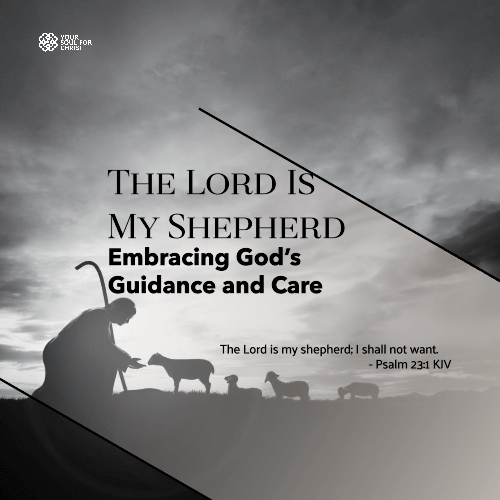The Lord is my shepherd; I shall not want.
Psalm 23:1 KJV
Who or what guides your life? This critical question encourages you to reflect on your source of direction, protection, and provision. Can you boldly declare, “The Lord is my shepherd”? A shepherd’s role is to lead, protect, and care for the flock, and spiritually, we all need a shepherd. When we claim, “The Lord is my shepherd,” we acknowledge God as the one who provides, protects, and guides us through every aspect of life. Without Him, we often find ourselves relying on our abilities, societal trends, or material pursuits, which may lead to temporary satisfaction but never true fulfilment.
Meanwhile, to proclaim, “The Lord is my Shepherd,” is not just a statement. It is a profound declaration of faith, relationship, and commitment. Also, it reflects your trust in God for every aspect of life. So, boldly claiming God as your shepherd demonstrates a personal and intimate relationship with Him. As Jesus said in John 10:14 (KJV): “I am the good shepherd, and know my sheep, and am known of mine.”
To truly claim God as your Shepherd, you must cultivate a personal relationship with Him. This involves more than acknowledging His existence. It means knowing Him intimately—understanding His character, trusting His love, and walking closely with Him. Just as a shepherd knows each sheep by name, God knows every detail about you and invites you to know Him in return. You can nurture this relationship through prayer, studying His Word, and spending time in His presence.
David, the author of this psalm, knew firsthand what it meant to be a shepherd. In 1 Samuel 17:34-37, he recounts how he defended his sheep from lions and bears. He risked his life to protect them. His experiences taught him to trust in God’s care and provision. David’s victory over Goliath is a testament to his unwavering faith in God as his Shepherd.
Jesus further emphasises this truth in John 10:11. Jesus is the ultimate Shepherd, demonstrating sacrificial love and unshakable commitment to His people.
The most peaceful life is one where God is your Shepherd. Just as a shepherd provides for every need of the sheep—God ensures we lack nothing essential. Trusting in God’s provision frees us from anxiety. Furthermore, it enables us to rest in the assurance that He will supply all our needs, as promised in Philippians 4:19.
Therefore, when you allow God to shepherd your life, you gain more than material provision. You find spiritual peace, security, and fulfilment. Likewise, His guidance leads you on the right path. His protection shields you from harm, and His presence assures you that you are never alone.
In conclusion, Psalm 23:1 invites us to reflect deeply on our relationship with God. To boldly claim, “The Lord is my Shepherd,” means to know Him personally, trust Him completely, and follow Him faithfully. It is a call to surrender control and allow God to guide, provide for, and protect us. This surrender leads to the most peaceful and fulfilling life possible—a life rooted in God’s care and love.
Finally, when God is your Shepherd, you find peace that transcends circumstances, provision that meets your needs, and protection that carries you through life’s darkest valleys. As Jesus promised in John 10:10 (KJV): “I am come that they might have life, and that they might have it more abundantly.”
So, who shepherds you? Can you confidently say, “The Lord is my Shepherd”? If not, today is the perfect time to invite the Good Shepherd into your life. In Him, you will discover the peace, security, and fulfilment your soul longs for. Let Him shepherd your life, and you will never walk alone, never lack what you need, and never be without His peace.
The most peaceful life is found in the loving arms of the Good Shepherd. Will you trust Him today?
